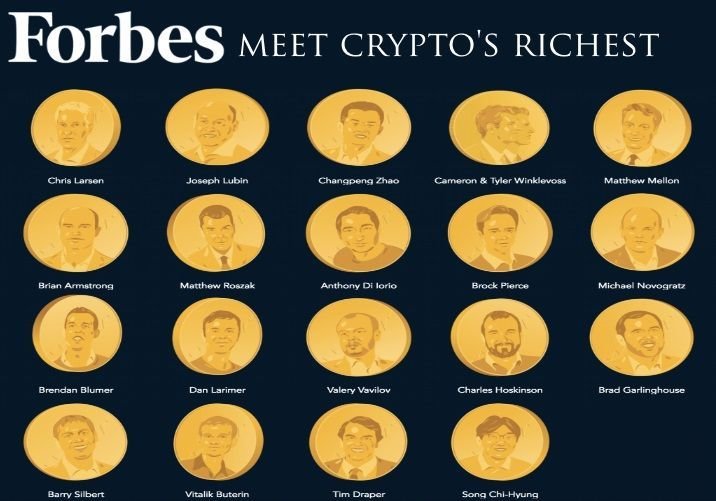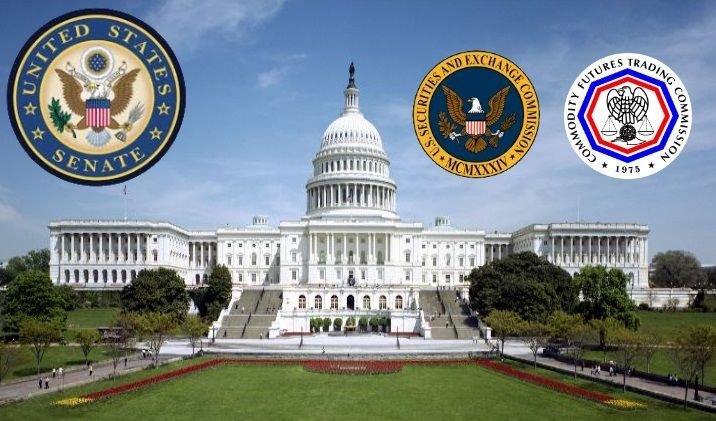
Forbes publishes List of the richest People in the Cryptocurrency World!
Singapore will not ban Cryptocurrencies: No Risk Concerns!
SEC and CFTC gave Testimonies at Senate Hearing on Cryptocurrencies and ICOs!
Singapore Airlines develops Blockchain-based App!
Canada, the Blockchain Role Model Country!
One of the most powerful Institutions in the Financial World declares War on Bitcoin!


The US business magazine Forbes, which since 1987 has selected The World's Billionaires, the richest person in the world, yesterday published an article online listing the known and (probably) the richest people in the cryptocurrency universe.
The list of the richest people in the cryptocurrency universe was first published by Forbes magazine and based on estimated numbers. Values are (again) estimated cryptocurrency holdings, post-tax profits from cryptocurrency trading and holdings in crypto-related businesses.
The estimates were calculated as of the January 19, 2018 deadline, so due to the high volatility of cryptocurrencies, the values are already obsolete. Nevertheless, from our point of view, the list provides a good overview of the largest influencers, in terms of capital, for the cryptocurrency market.
For connoisseurs of the industry, the list includes many big and well-known names from the crypto world. From our point of view, the names can be divided into four groups: founders and developers of cryptocurrencies, investors, heads of popular crypto currency exchanges and players in the crypto business sector. It is striking that it does not create a woman in the list. The average age, according to Forbes, is 42 years, which is much lower than the "The World's Billionaires" list with an average age of 67 years.
The most famous founders and developers from the list are Vitalik Buterin and Joseph Lubin (Ethereum), Chris Larsen (Ripple) and Dan Larimer (Steem, EOS andBitshares). The most famous investors in the list are the Winklevoss twins, who received $ 65 million through an intellectual property lawsuit against Facebook founder and former fellow student Mark Zuckerberg.
Allegedly, they are said to have bought 91,666 Bitcoins for around $ 120 each. Furthermore, the list includes the founders and CEOs of the popular cryptocurrency exchanges Coinbase (Brian Armstrong) and Binance (Changpeng Zhao).
Ripple co-founder Chris Larsen is at the top of the list, with an estimated $ 8 billion in assets. If the Ripple price had not fallen so much in recent weeks, Larsen could even have a fortune of about $ 59.9 billion with his 17 percent stake in RippleLabs, according to Forbes. He would have overtaken even Mark Zuckerberg with his about 55 billion US dollars.
I'm sure. The one or the other anonymous investor certainly does not appear in the list. If Satoshi Nakamoto actually exists, he certainly would be a candidate for the top 10. Still, in the following we find the very interesting, complete list of known cryptocurrency billionaires and millionaires, according to Forbes magazine (in US dollars):
Chris Larsen co-founder of Ripple 7.5 to 8 billion
Joseph Lubin co-founder of Ethereum 1 to 5 billion
Changpeng Zhao CEO of Binance 2 billion
Cameron & Tyler Winklevoss investors 900 million to 1.1 billion
Matthew Mellon Investor 900 million to 1 billion
Brian Armstrong CEO of Coinbase 900 million to 1 billion
Matthew Roszak Co-founder of Bloq 900 million to 1 billion
Anthony Di Iorio Co-founder of Ethereum $ 750 million to $ 1 billion
Brock Pierce Chairman of the Bitcoin Foundation 700 million to 1 billion
Michael Novogratz CEO of Galaxy Digital 700 million to 1 billion
Brendan Blumer CEO of Block.one 600 to 700 million
Dan Larimer CTO and co-founder of Block.one 600 to 700 million
Valery Vavilov CEO of Bitfury 500 to 700 million
Charles Hopkinson co-founder of Ethereum 500 to 600 million
Brad Garlinghouse CEO of Ripple 400-500 million
Barry Silver CEO of Digital Currency Group 400-500 million
Vitalik Buterin Co-founder of Ethereum 400 to 500 million
Tim Draper Founder of Draper Associates 350 to 500 million
Song Chi-hyung CEO of Dunamu Inc 350 to 500 million

The Singapore government has stated that it does not consider it necessary to prohibit cryptocurrency trading. Tharman Shanmugaratnam, Singapore's Deputy Prime Minister and Chairman of the Monetary Authority of Singapore (MAS), said in a written response to MEPs yesterday that cryptocurrencies and related trading activities currently pose no threat to Singapore's financial system.
Trading with cryptocurrencies is alright
He explained that the MAS "has carefully studied these developments and the potential risks they pose. There is currently no good reason to ban cryptocurrencies trading."
The comments came before a parliamentary meeting on February 5 as a direct response to lawmakers Saktiandi Supaat, Lim Biow Chuan and Cheng Li Hui, who questioned the Prime Minister about the possibility of banning the cryptocurrency in Singapore, according to an order paper.
The vice premier wrote:
Therefore, Shanmugaratnam said regulators "have no major systemic worries about cryptocurrencies".
The comment is also in line with a report from October 2017, in which Ravi Menon, managing director of MAS, stated that the central bank would not regulate crypto currencies.
However, Shanmugaratnam said in his written response that the institution is aware of the potential use of cryptocurrency in illegal activities such as money laundering and takes appropriate action to address the problem.
The MAS will introduce anti-money laundering and anti-terrorism funding (AML / CFT) to intermediaries who buy, sell or exchange cryptocurrencies, he added: "We set out this AML / CFT regulatory framework for virtual currency brokers last year.

On February 6, the US Senate Banking and Finance Committee, held a hearing on cryptocurrency, ICOs, and market regulation. The speakers were Jay Clayton, Chairman of the SEC, and Christopher Giancarlo, Chairman of the CFTC. Overall, the outcome to which the two officials came can be seen as reassuring for the crypto community.
Hearings of representatives from business, society and administration are not uncommon in democratic systems. It is not so much a rapport, in which the person charged has to answer for his actions, but rather the solicitation of expert opinions to stimulate legislative initiatives. There are these hearings both in smaller parliamentary rounds as well as in committees in the Bundestag or other parliaments. The same thing happened yesterday when Securities and Exchanges Commission (SEC) Chairman Jay Clayton and his Commodity Futures Trading Commission (CFTC) member Christopher Giancarlo stepped in front of the Senate Banking Committee.
For about an hour and a half, representatives of the two major regulators spoke to representatives of the Congress on cryptocurrencies, ICOs, and the desire for orderly regulation. Both men took a similar approach to finding a regulatory approach that would help the crypto-ecosystem as a whole rather than deprive it of its strengths.
SEC Chairman Clayton once again underlined an authority's view that Bitcoin and other cryptocurrencies, despite the term currency they carry on their behalf, can not be considered equivalent to Fiat currencies, but should be considered securities in current usage. Thus, according to SEC interpretation, cryptocurrencies are a new asset class that should be regulated similarly to the traditional financial market. In general, connecting elements, such as the Bitcoin futures launched in December of last year, are a welcome instrument for gaining regulatory control.
"We owe it to the new generation to respond to their enthusiasm for virtual currencies not with devaluation, but with a thoughtful and deliberate response," said Christopher Giancarlo, whose own children had come into contact with the concept of financial markets via cryptocurrencies. Like his children, millions of young people worldwide are doing what makes cryptocurrencies a kind of entry into the global financial world. One must build on this movement, but at the same time also prevent the newly formed trust from being exploited by fraudsters and dubious projects. Specifically, the explosion of new ICOs is both the SEC and the CFTC to think.
The bottom line is therefore no new groundbreaking insight. SEC and CFTC want more legislative power to steer developments in the crypto market in the right direction. However, both also acknowledge that total control is neither in their mind nor within their means. Rather, it is important to create in the general population a better awareness of crypto investments and the underlying blockchain technology - it is to be hoped that this has succeeded, at least for the present senators.
What is wrong with you copying my post I will report you for that!!!
Coins mentioned in post: